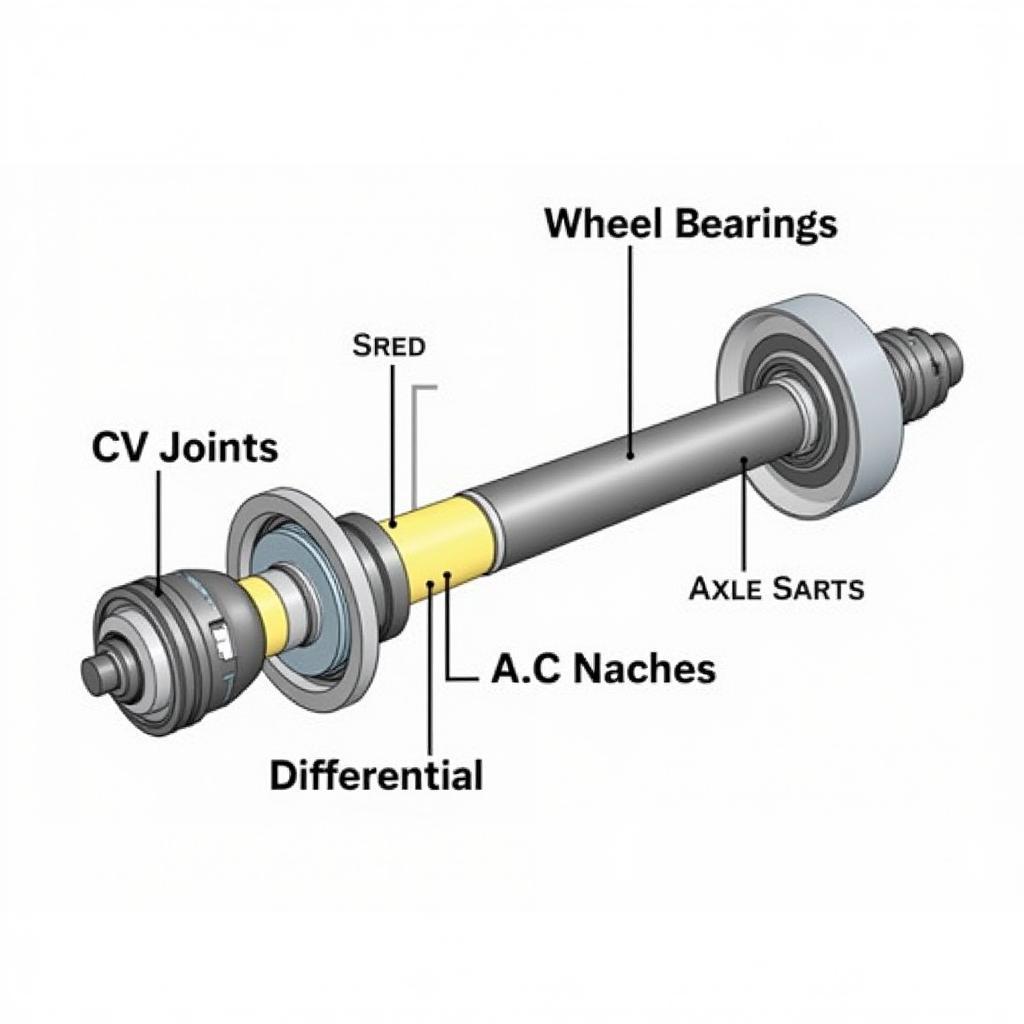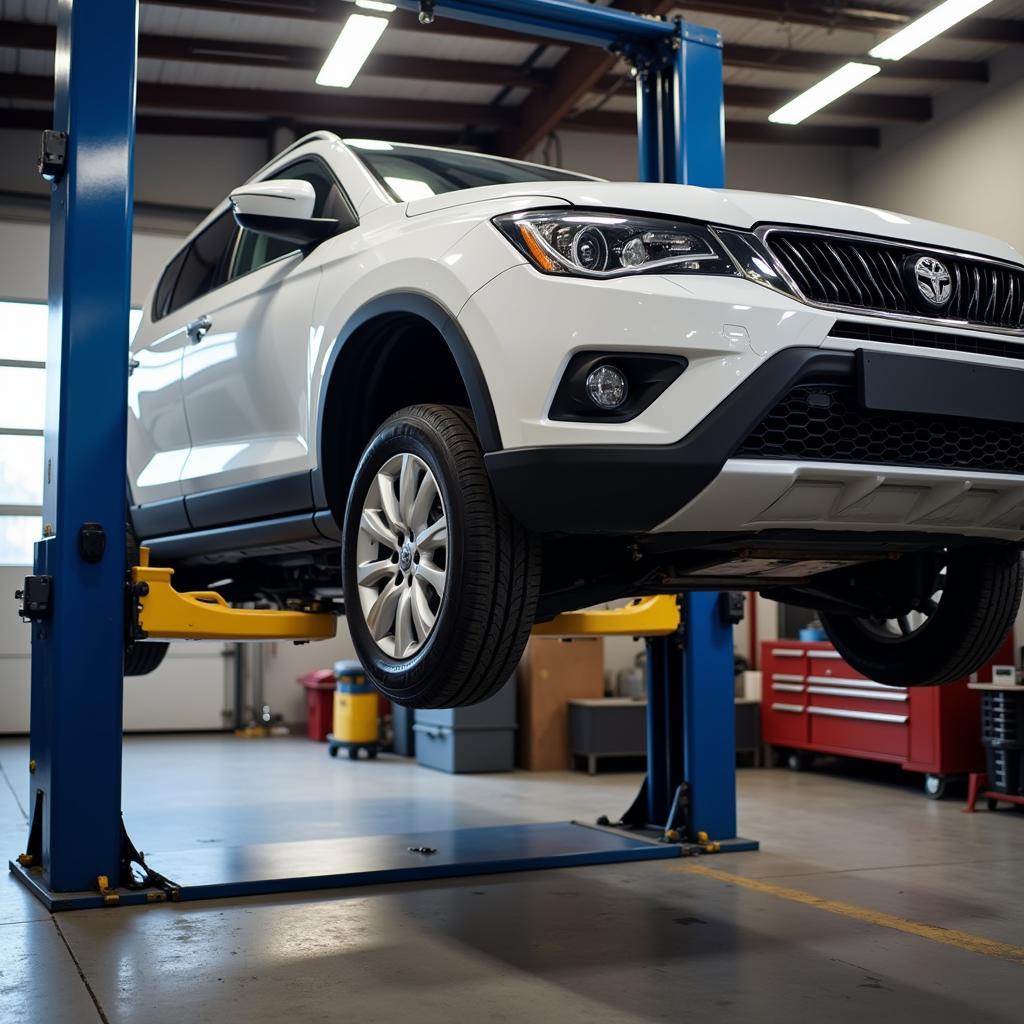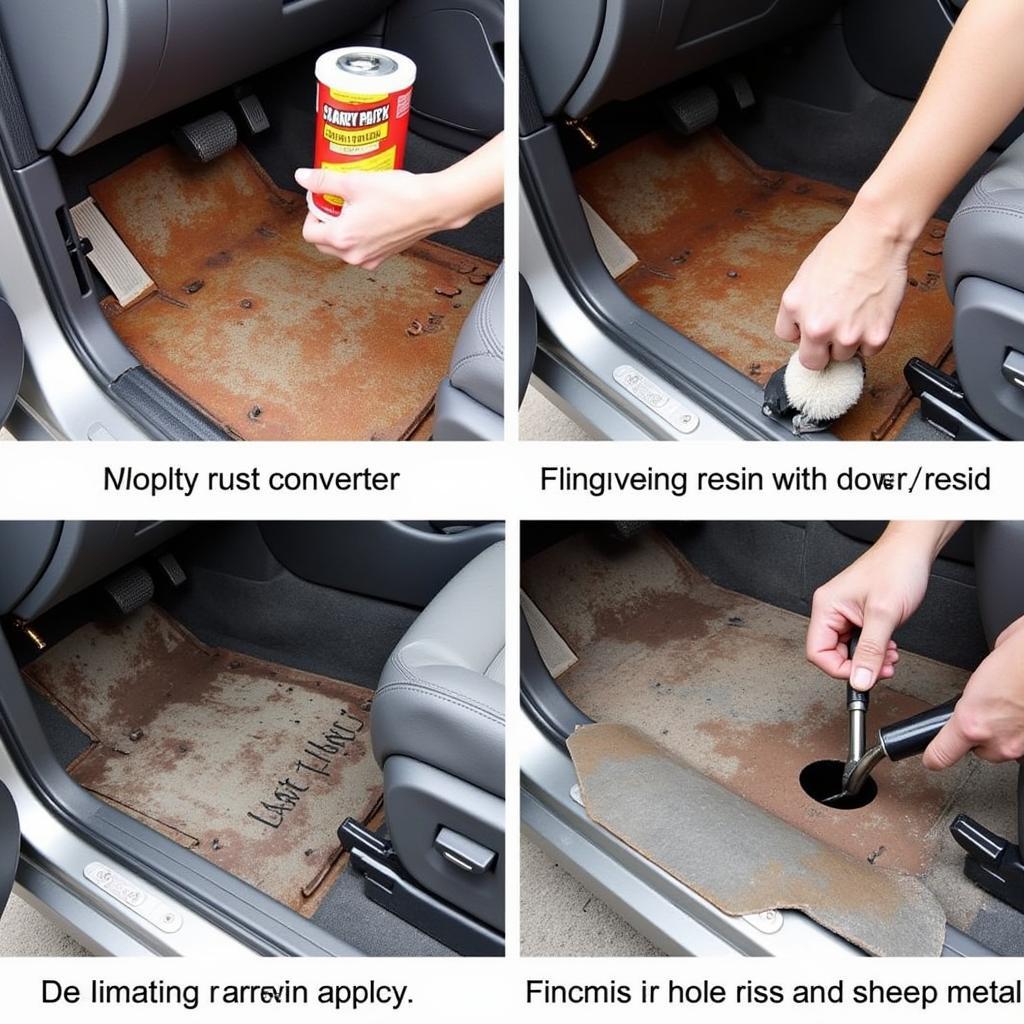Car axles are an essential part of your vehicle’s drivetrain, responsible for transmitting power from the engine to the wheels and supporting the weight of your car. They are built to withstand tremendous stress and strain, but like any other mechanical component, they can encounter problems over time. This article delves into the common Car Axle Problems, their symptoms, potential causes, and the solutions to get you back on the road safely.
 Car Axle Diagram
Car Axle Diagram
Recognizing the Signs of Axle Problems
Identifying axle problems early can save you from costly repairs and potential hazards on the road. Here are some telltale signs that your car might be experiencing axle problems in cars:
- Strange noises: Clunking, clicking, or humming sounds, particularly when turning or accelerating, can indicate worn-out CV joints, damaged wheel bearings, or a failing differential.
- Vibrations: Excessive vibrations felt through the steering wheel, floorboard, or seat, especially at specific speeds, could point towards a bent axle shaft, worn-out bearings, or loose components.
- Uneven tire wear: If you notice one or more tires wearing out faster than the others, it could signify an alignment issue stemming from a bent axle.
- Grease leakage: Grease leaking around the wheels or behind the brake assembly could be a sign of damaged CV joint boots, leading to premature wear and tear.
- Vehicle pulling to one side: When your car pulls to one side while driving, especially during acceleration or braking, it might indicate a problem with the axle shaft or a failing wheel bearing.
Common Causes of Car Axle Problems
Several factors can contribute to car axle issues, ranging from normal wear and tear to external damage:
- Impact damage: Hitting potholes, curbs, or other road hazards at high speeds can bend the axle shaft or damage other axle components.
- Lack of lubrication: Insufficient lubrication in the CV joints or wheel bearings can lead to excessive friction, premature wear, and eventual failure.
- Normal wear and tear: Over time, the constant stress and strain of driving can wear down axle components like CV joints, wheel bearings, and axle seals.
- Improper installation: Incorrect installation of axle components during repairs or modifications can lead to premature wear, damage, and potential failure.
Diagnosing and Addressing Axle Issues
Diagnosing axle problem on car typically involves a visual inspection, listening for unusual noises during a test drive, and physically checking for play or looseness in the axle components.
Based on the diagnosis, the solutions can range from simple repairs to complete axle replacement:
- CV joint replacement: Worn or damaged CV joints are typically replaced as a complete assembly to ensure optimal performance and prevent future problems.
- Wheel bearing replacement: Worn wheel bearings can be noisy and dangerous if left unattended. They are typically pressed out and replaced with new ones.
- Axle shaft repair or replacement: A bent or broken axle shaft might require straightening or complete replacement, depending on the severity of the damage.
- Differential repair or replacement: Differential problems can be complex and often require specialized knowledge and tools for repair or replacement.
“Addressing axle issues promptly is crucial,” says John Miller, a seasoned automotive engineer with over 20 years of experience. “Ignoring these problems can lead to more extensive damage, costly repairs, and even compromise your safety on the road.”
Preventing Future Axle Problems
While some axle problems are unavoidable due to unforeseen circumstances, proactive maintenance can significantly reduce the risk of encountering these issues:
- Regular inspections: Schedule routine inspections of your car’s axles, especially if you frequently drive on rough roads or encounter harsh driving conditions.
- Timely lubrication: Ensure that your CV joints and wheel bearings are adequately lubricated according to the manufacturer’s recommended service intervals.
- Careful driving: Avoid potholes and other road hazards as much as possible. Slow down when driving over speed bumps or uneven surfaces.
- Professional repairs: Always opt for reputable mechanics with experience in axle repairs to ensure that the job is done correctly and with quality parts.
 Car on Lift for Axle Repair
Car on Lift for Axle Repair
Conclusion
Car axle problems, while common, should never be ignored. By recognizing the symptoms, understanding the causes, and taking proactive measures, you can ensure the longevity of your car’s axles, enjoy a smoother ride, and most importantly, stay safe on the road.
If you suspect any issues with your car’s axles, don’t hesitate to contact the experts at AutoTipPro for a thorough inspection and reliable solutions. You can reach us at +1 (641) 206-8880 or visit our office at 500 N St Mary’s St, San Antonio, TX 78205, United States.
FAQs about Car Axle Problems
1. How much does it cost to fix car axles problems?
The cost of axle repair varies widely depending on the specific problem, car model, labor costs, and whether you choose OEM or aftermarket parts. Simple repairs like CV boot replacement can cost a few hundred dollars, while more extensive repairs like axle shaft or differential replacement can cost upwards of a thousand dollars.
2. Can I drive my car with a bad axle?
Driving a car with a bad axle is highly discouraged. It can be dangerous as it affects your car’s handling, braking, and overall stability. If you suspect an axle problem, it’s crucial to get it diagnosed and repaired by a professional as soon as possible.
3. How long do car axles typically last?
Car axles are designed to be durable, but their lifespan can vary depending on driving habits, road conditions, and maintenance. Generally, you can expect car axles to last anywhere between 60,000 to 150,000 miles or even longer with proper care.
4. Can a bad axle cause my car to shake?
Yes, a bad axle, particularly a bent axle shaft or worn wheel bearings, can cause vibrations that you might feel through the steering wheel, floorboard, or the entire car, especially at certain speeds.
5. How often should I get my car axles checked?
It’s a good practice to have your car axles inspected annually or as part of your regular maintenance schedule. If you frequently drive on rough roads or notice any signs of axle problems, have them checked sooner.






Leave a Reply